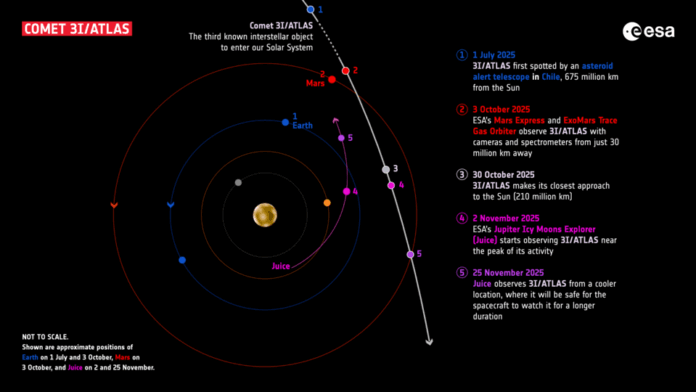
WASHINGTON, DC – As the interstellar object 3I/ATLAS races toward the inner solar system, Harvard astrophysicist Avi Loeb is intensifying his calls for the United Nations to develop formal protocols in the event of extraterrestrial contact. Loeb’s appeal, though not new, has taken on renewed urgency in recent weeks as the object—traveling faster than any known comet at roughly 130,000 kilometers per hour—approaches its closest point to the Sun.
Loeb estimates a 30–40 percent probability that 3I/ATLAS could be an artificial probe, noting that its trajectory and emissions deviate markedly from natural expectations. The object’s behavior has reignited a global debate about how—and who—should respond if humankind ever receives a verifiable signal from beyond.
Avi Loeb has long argued that humanity’s institutions are dangerously unprepared for first contact. His 2021 book Extraterrestrial: The First Sign of Intelligent Life Beyond Earth sparked intrigue and controversy by proposing that 2017’s interstellar visitor ‘Oumuamua might have been an alien artifact.
Now, with 3I/ATLAS drawing near, Loeb contends that the absence of a coordinated response plan is a “policy blind spot of existential proportion.” In remarks shared with several scientific outlets, Professor Loeb urged the United Nations Office for Outer Space Affairs (UNOOSA) to create “clear diplomatic, scientific, and ethical frameworks” for contact scenarios—whether through radio signals, recovered artifacts, or direct engagement.
But therein lies the problem: the UN itself is a fractured institution struggling to maintain consensus even on terrestrial crises.
The notion that the UN could speak for all humanity in an alien encounter is, to many, aspirational at best. Member nations remain at odds over funding for peacekeeping missions, NATO contributions, and the ongoing Russia-Ukraine conflict, which continues to paralyze Security Council cooperation.
In that context, Professor Loeb’s call may be less a literal policy proposal than a symbolic reminder: Earth’s governance systems remain provincial, mired in division, and unready for the truly unknown.
If humanity’s first interaction with extraterrestrials occurred tomorrow, there is no legal or political structure to determine who speaks, who represents Earth, or what protocols govern the exchange. That void, Loeb warns, is not just theoretical—it is reckless.


